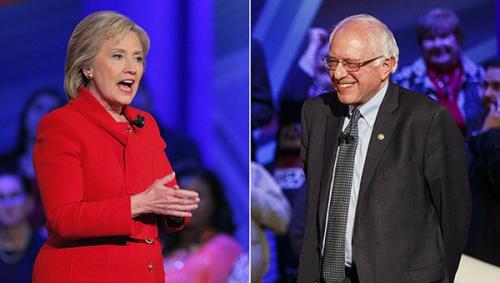In addition to sanders' demand not to withdraw from the election, in addition to winning the presidential nomination, more importantly, he hopes that the concept and issue of "safeguarding social fairness" advocated by him will continue to receive attention and the opportunity for substantive change.

Caijing reporter Zuo Xuan/Wen
On June 7, the Democratic primary was held in California, New Jersey, New Mexico, Montana, and North and South Dakota, and all Democratic primaries except Washington, D.C., were over. At 9 p.m. EST on the 7th, the results of the new Jersey state that took the lead in ending the vote showed that Hillary Clinton won with 58.7% support for Sanders at 41.3%. Judging by the number of delegates, Hillary Clinton has received the 2383 votes needed for the nomination, becoming the Democratic Party's presumptive presidential candidate.
However, her rival Sanders did not immediately announce his withdrawal from the race. Sanders, who canvassed for votes in California on June 5, was asked if he would continue the competition until the National Convention, to which Sanders replied "that's for sure." Sanders' press spokesman, Michael Briggs, said in a statement the next day that he regretted that the media had been too quick to make a judgment because it would be wrong to count the votes of super party representatives before the National Party Congress on July 25, who would change their minds at any time, and that the Sanders team's job now was to persuade the super party representatives who had not yet made a clear vote, and Sanders was the candidate who was most likely to defeat Trump.
There were 715 super-delegate votes in the Democratic Party, accounting for about 15% of the total votes of the National Convention, and the super-party representatives included 434 votes in the Democratic National Committee, 20 votes for outstanding democratic leaders (former Democratic President, Vice President, Speaker of Congress, and President of the National Assembly), 193 votes for Democratic members in the House of Representatives, 47 votes for Democratic members in the Senate, and 21 votes for Democratic governors.
According to Bloomberg, there are currently about 571 super party representatives who express support for Hillary clinton and about 48 who express support for Sanders. To beat Hillary Clinton at the National Convention, Sanders would need at least 75 percent of the super-delegate vote, which is unlikely.
Bill Whalen, a researcher at the Hoover Institution in California, told Caijing that in addition to Sanders' demand not to withdraw from the election, in addition to wanting to win the presidential nomination, more importantly, he hopes that the concept and issues of "safeguarding social fairness" advocated by him will continue to receive attention and get the opportunity for substantive change.
With the end of the last "Super Tuesday," Sanders faced increasing pressure from within the party. Clinton said she voluntarily withdrew from the 2008 primary election and called on her supporters to turn to then-Democratic presumption candidate Barack Obama, hoping Sanders would follow suit and cement the party's unity.
On June 5, Sanders received a call from President Barack Obama while campaigning in San Francisco and spoke to him for about 45 minutes on San Francisco's Financial District Street. Sanders did not say whether Mr. Obama persuaded him to withdraw from the election on the phone, saying only that he would often talk to Mr. Obama on various issues. However, according to US media reports, Obama will soon officially announce his support for the nomination of Hillary Clinton as the presidential candidate.
Some political analysts point out that Sanders is not facing the same scene as Hillary Clinton 8 years ago. Both Hillary and Obama are "in-establishment" Democrats, and apart from some differences in judgments, such as whether to start a war in Iraq, they are consistent on most policy issues, such as their support for health care reform, except that they should force universal health insurance.
Sanders and Hillary Clinton's policy differences are directional, for example, on the issue of reforming Wall Street, Sanders supports the splitting of large banks, while Hillary only says that it should be better regulated; on trade issues, Sanders opposes a series of free trade agreements, including the North American Free Trade Agreement and the TPP, which Hillary clinton supports; on the issue of government budgets, Sanders supports increasing the federal government's spending to promote major social welfare policies, and Hillary Clinton is more cautious about the balance of payments.
Based on these differences, Sanders has little chance of getting the Democratic vice presidential nomination after he withdraws, or the same as Hillary Clinton' nomination for secretary of state.
So far, Sanders has won at least 1,616 Democratic votes, which is not a far cry from Hillary Clinton's support. Some Sanders supporters said none of them would vote if Sanders withdrew, or would vote for Republican candidate Trump.
If Sanders refuses to switch to hillary support, or even continues the campaign until July 25, Hillary clinton's challenge to bridging the divide will be no less than the Republican party's presumed candidate, Trump. Bill Richardson, a former governor of Mexico and president of the 2004 Democratic National Convention, said that in order for Democrats to rally around Hillary, Sanders' campaign ideas should be included in the Democratic platform. Income disparities are a common source of anger among voters across both parties, and Democrats should work to raise the minimum wage and earn equality in income.